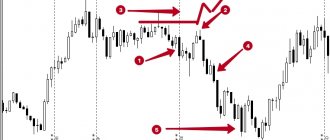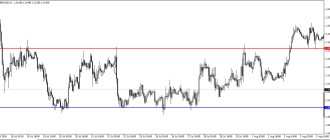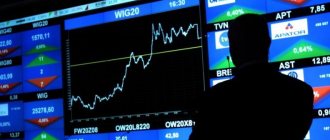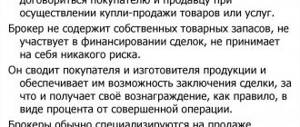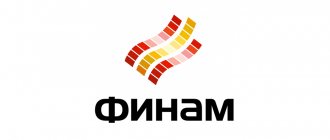Entry posted on 02/1/2014 by Vadim Fedorovich in the section regulation and legislation Date of last update of the material: 02/9/2019
Introduction
Until recently, there was not a single law regulating the Forex market in Russia: the activities of dealers were carried out on the basis of the Federal Law “On the Securities Market” dated April 22, 1996 N 39-FZ. At the end of 2013, a revised and expanded version was published, and on December 16, 2014, Federal Law No. 460-FZ - the Law on Forex - was adopted.
Below we will consider the most important issues of interest to market participants:
- how and by whom the Forex market in Russia was regulated until 2016;
- what awaits Russian Forex participants after 2021;
- what role do SROs and the Central Bank of the Russian Federation play in regulating the forex industry?
Everything related to the law regulating the Forex currency market in Russia has been collected and systematized by us here since 2014. Stay tuned for regular updates.
History of Forex in Russia
Around the mid-2000s, the active spread of affordable and fast Internet connections began, which makes it possible to start trading in markets without leaving home. In parallel with this, the first Russian Forex dealers, who still remain the most popular and largest players in the industry - Alpari, Forex Club and InstaForex, are beginning to gain momentum.
Despite the fact that there were no rules at all, these companies acted honestly, which cannot be said about the huge number of other one-day pseudo-brokers. When a person is promised that in a week he will learn to earn 10% per day, he certainly already sees himself as a financial market shark. But the results are usually very disastrous. In general, until 2013, everything was approximately the same.
Already in 2013-2014, the first steps to bring the legislation in order began. If previously companies could draw any quotes they wanted, by this time they were required to publish exchange rates. That is, it was still possible to draw, but another question is that the client can look at what other dealing centers publish and understand that somewhere he is being deceived.
At the same time, such fundamental concepts as the Forex market, Forex broker appear, and the nature and procedure of proceedings in the event of a conflict situation are established. The industry began to take on a relatively transparent appearance, but Forex regulation in Russia not only did not reach international standards, but was generally in its embryonic stage . Nevertheless, a start had been made.
Then a very difficult period began, when ideas for regulating Forex in Russia varied - from bringing trading into an orderly form through the exchange to separating the foreign exchange market into the field of gambling. By the way, these proposals show how far the deputies and other gentlemen are from a real understanding of the essence of the process. Now almost everyone knows that Forex is an over-the-counter structure and trading in any single form is impossible in principle. The similarity to gambling can only be seen by a person who has never traded.
In general, the emergence of the self-regulatory organization TsRFIN gave impetus to the process of systematization of dealing in Russia. Requirements for membership in this SRO have been introduced, fees, rules, and so on have been determined. In the end, it all came down to the fact that small companies, most of which operated on the principle of a forex kitchen, simply could not afford it.
From this moment the participation of the main regulator, the central bank, begins. It operates through an SRO, everything is aimed at protecting the interests of clients.
The first SRO is being created - the Association of Forex Dealers, abbreviated as AFD. For the first time, proposals have been made to limit leverage. And indeed, indicators of 1:500 are simply ridiculous; for a beginner, such opportunities only give an excuse to once again try to earn money “quickly”. As a result, the deposit was drained and everything started again. Around this time important comments were made and new demands were made, namely:
- Sufficient technical support . We all sometimes see the inscription “No connection”. And what a coincidence - it appears either before the news is released, or immediately after. Of course, it can be attributed to the workload, but the pattern of such events irritates many people. By the way, the Forex club thus provoked the loss of a huge amount of client funds. This is an unproven statement, but just talking to those who traded there is enough. Previously, this was a very popular technique of this Forex dealer, but now it seems to have become better.
- Derivatives trading . Simply put, CFDs on shares. Here again everything comes down to leverage, since initially the stock market was the domain of the largest banks, which created their own brokers. Here's an example:
- Tinkoff;
- Sberbank;
- VTB.
A conservative approach and investment programs imply a logically sound investment in securities. And forex dealers turn stock trading into just another “casino” in the opinion of many. As a result, this list of tools was excluded.
An example of a list of CFDs on indices alone from the broker FiNMAXFX
All of the above regarding attempts to make Forex regulation in Russia consistent with world standards can be called the first important step towards the form in which all activities are now carried out. All these movements since 2012 have led to the fact that the market for dealing services has become much better quality, outright scammers have practically disappeared, and trust in large companies has grown significantly, since they could proudly declare their membership in an SRO, which, in turn, controlled by the central bank itself. But here it is important to understand that you can write anything on your website, most citizens simply will not understand the abbreviations, so it is important to thoroughly understand when another broker with excellent offers appears.
Drawing conclusions
There is no need to view Forex regulation as something negative; rather, on the contrary, the competent work of regulators will in many ways make the market much better.
Only those companies that are running a frankly low-quality company should be afraid of stock exchange supervision. If the broker follows an honest policy, then he does not need to be afraid of this control at all.
In any case, the emergence of regulators is an objective step in the development, formation and maturation of the market. In any case, I hope that I was able to convey really useful things to you, and you can draw your own conclusions.
Forex in Russia: modern view
So, since 2015, we have a very clear set of rules for working in the market and clauses regulating the activities of a Forex dealer. The law is called “Federal Law No. 460 on the regulation of the Forex market in Russia.” Now this seems to be a truly full-fledged financial system, which is not so easy to get into.
However, there are a huge number of companies that continued to operate without any licenses and completely not complying with what is prescribed in the law.
The scheme of work is quite simple - the company is registered abroad, usually in some popular offshore zone. Local licenses are obtained there, which are essentially just a piece of paper. And in fact, how much trust does a license from the offshore securities committee deserve?
I also recommend reading:
TOP 5 trend indicators for Forex. Review + recommendations for trading
In training materials for beginners, you can often see the statement that it is better to trade only in the direction of the trend. This is quite reasonable [...]
The result is the following: companies that are authorized to provide access to the Forex market find themselves at a complete disadvantage. Due to restrictions, they simply cannot provide the same conditions as their foreign competitors. This has led to an absurd situation - a Russian company is being created under the brand of a well-known offshore Forex dealer, which means that the client can choose where to register - in a familiar offshore company or in a domestic licensed one. And the absurdity lies precisely in the fact that the conditions will be radically different, and not in favor of the domestic one:
- Leverage has been reduced to 1:50. We can say that it is quite enough, but after you get used to the standard 1:100-1:500 it seems a little strange.
- The list of trading instruments is not very diverse. And that's putting it mildly. For example, with InstaForex or Finmax you can trade hundreds of CFDs on shares, while the entire currency set is present by default. And also raw materials, the commodity market. Most people don’t need this, but it’s nice to have the opportunity to choose, which is important for many.
- Taxes. Everyone is accustomed to the fact that what they earn in full goes to a card or some kind of EPS, nothing is withheld, and the offshore broker does not transmit any information. And imagine the surprise of those who come to a licensed broker for the first time when a tax issue suddenly comes up. In general, on the one hand, everything is fair and taxes must be paid, but no one will do this if it is possible to avoid such a procedure.
Already in 2021, new licensed forex dealers started operating. Finam Forex was the first, followed by VTB24 Forex, then the main Russian Forex dealers joined, which previously made up the real market - Alpari, Forex Club, InstaForex. All of them opened their own legal entities that met all the requirements of the regulator.
The main point among these requirements is the presence of equity capital in a fairly substantial amount, which was initially set at 100 million rubles. In this regard, very few well-known companies were able to obtain licenses. However, the result of all these actions and generally movements regarding the regulation of the Forex market in Russia was extremely interesting statistics - there were an order of magnitude, if not two, fewer clients in licensed brokers than in others.
The reason lies in what steps were taken and how the industry began to be streamlined in general. The main provisions are as follows:
- From now on, the Forex market is regulated accordingly - by the Central Bank through the SRO. In general, everything is orderly, the regulator is monitoring everything that is happening.
- If any new company wants to start its activities, it must be a member of the SRO, that is, meet all the requirements and follow the requirements.
- The initially established minimum capital level increases as the total amount of clients' money grows. It is clear that not in equal quantities, but only in the amount of 5% of what is in excess of 150 million.
- Forex dealer employees must have appropriate education and certification. Specialty: securities market and brokerage services.
- Collective responsibility within the SRO. No one is insured against loss of capital, therefore all companies that are also members of the SRO provide financial assistance in repaying debt obligations that arise in the event of bankruptcy and the inability to fully pay money to clients. Everyone contributes an amount that is determined by the company's turnover.
- A license can only be obtained by a legal entity registered in Russia, that is, all offshore companies had to create local companies and obtain licenses through them.
- It is necessary to indicate in advertising the fact that trading in financial markets with leverage can lead to significant losses. In principle, this is usually indicated in tiny font at the very bottom of the websites of almost all brokers.
How will the law restrict the activities of brokers?
In general, in the Russian Federation, large banking companies may have divisions that provide dealer services to individuals trading on the market. Foreign companies that are not registered in the legal field of the Russian Federation are de jure not market participants, but de facto, their activities are not particularly limited by the regulator. However, there is a certain limitation, namely, companies of this kind cannot advertise themselves on the territory of the Russian Federation.
Forex dealers are prohibited from placing transactions on the interbank market, subject to their subsequent execution and coverage within the company itself. In addition, the dealer is obliged to work like a bank, that is, to maintain reporting documentation. Documentation must be maintained by an employee assigned to the appropriate position. Information on completed transactions is provided primarily to the Central Bank.
No broker has the right to keep funds of its clients in controlled accounts - this is prohibited by law. This restriction is primarily intended to protect the funds of potential investors in the event of a possible bankruptcy of the dealer. All client funds are held in nominee accounts.
After receiving the appropriate status, the company automatically becomes a tax agent. The status of a tax agent obliges the broker to withdraw client funds only to accounts opened in Russian banks and to pay taxes on client profits.
In addition, Forex dealers provide the opportunity to work with only 26 currency pairs, and other instruments will not be available. It is worth saying that such restrictions are inconvenient for everyone.
Forex in Russia in 2021
A significant event occurred in 2021 - the licenses of some Forex brokers were revoked, including the most famous brands on the market - Alpari, Forex Club and others. Many regard this as a signal of an attempt by the state to take full control of this market. Today, only a few Forex dealers have licenses, and from the name it becomes clear on what basis the licenses were revoked:
- Alpha Forex. The bank seems to be commercial, but we know.
- Finam Forex. An old-timer who always followed the letter of the law, which is why the client base is very small.
- VTB Forex. State Bank, everything is obvious.
- PSV Forex. Similar to the previous one.
